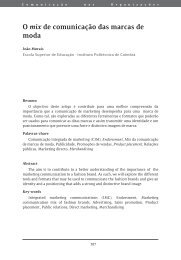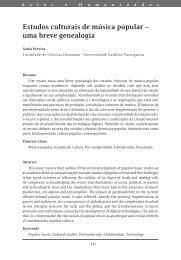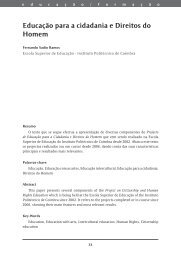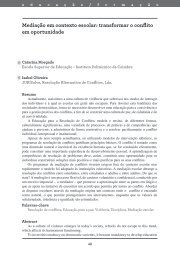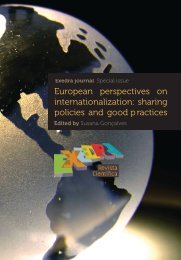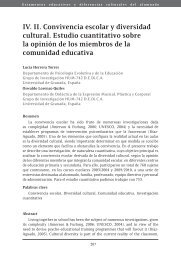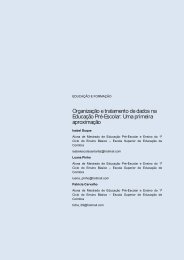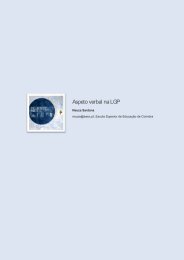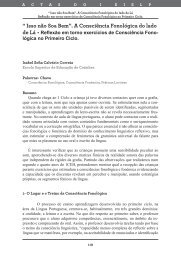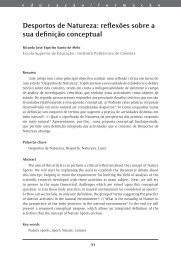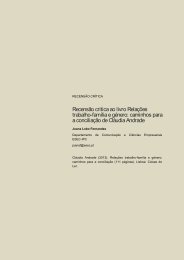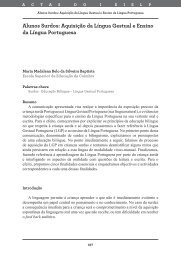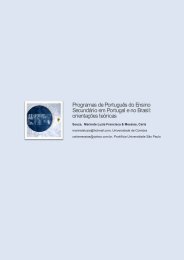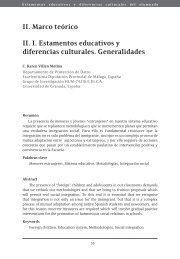The role of community art projects within and without the ... - Exedra
The role of community art projects within and without the ... - Exedra
The role of community art projects within and without the ... - Exedra
- No tags were found...
You also want an ePaper? Increase the reach of your titles
YUMPU automatically turns print PDFs into web optimized ePapers that Google loves.
Ineke Braak – van Kasteel • <strong>The</strong> <strong>role</strong> <strong>of</strong> <strong>community</strong> <strong>art</strong> <strong>projects</strong> <strong>within</strong> <strong>and</strong> <strong>without</strong> <strong>the</strong> school curriculum<strong>The</strong> shows are produced in close co-operation with <strong>the</strong> actors, who are all local.Helped by pr<strong>of</strong>essional writers <strong>and</strong> stage directors, <strong>the</strong> local people show <strong>the</strong>ir ownexperiences in <strong>the</strong> performances. <strong>The</strong> result was <strong>the</strong> soaring Community Art production“H<strong>and</strong> in H<strong>and</strong>”. A show full <strong>of</strong> music, dance <strong>and</strong> <strong>the</strong>atre. <strong>The</strong>re were ten performances<strong>of</strong> <strong>the</strong> show in <strong>the</strong> Zuidplein <strong>The</strong>atre, <strong>the</strong> home <strong>of</strong> <strong>the</strong> Rotterdam Wijk<strong>the</strong>ater company(RWT)<strong>The</strong> Rotterdams Wijk<strong>the</strong>ater (Rotterdam Community-based <strong>The</strong>atre) is a <strong>the</strong>atrecompany that, supported by Rotterdam City Council, produces <strong>the</strong>atre for <strong>and</strong> by peoplefrom <strong>the</strong> <strong>community</strong>. <strong>The</strong> main aim <strong>of</strong> this <strong>community</strong> <strong>art</strong>s organisation is to developnew writing, accessible, appealing <strong>and</strong> relevant to people who do not normally go to <strong>the</strong><strong>the</strong>atre. In order to invite new <strong>and</strong> culturally excluded audiences <strong>the</strong>y present <strong>the</strong>atreperformances that are based on <strong>the</strong> stories <strong>of</strong> <strong>the</strong>ir own <strong>community</strong>, <strong>and</strong> <strong>the</strong>reforedealing with issues that are relevant to those groups. By <strong>the</strong> sheer amount <strong>of</strong> newwork <strong>the</strong>y develop, <strong>the</strong> more than 60, usually packed, shows that are performed in <strong>the</strong>various <strong>community</strong> centres <strong>and</strong> <strong>the</strong> string <strong>of</strong> new <strong>projects</strong> in <strong>the</strong> pipeline, <strong>The</strong> RotterdamWijk<strong>the</strong>ater is living pro<strong>of</strong> that <strong>the</strong>atre by <strong>and</strong> for local people can be relevant, interesting,moving <strong>and</strong> entertaining.Some characteristics: RWT does not present <strong>the</strong> <strong>community</strong> with an existing play,but develops plays based on stories <strong>and</strong> events told <strong>the</strong>m by <strong>the</strong> local people.All actors are drawn from <strong>the</strong> <strong>community</strong> - <strong>the</strong> people <strong>of</strong> RWT only facilitate, coach,direct, <strong>and</strong> provide technical back-up <strong>and</strong> assistance.RWT works primarily in disadvantaged neighbourhoods with people who have littleor no experience <strong>of</strong> <strong>the</strong>atre, ei<strong>the</strong>r as performers or audience.<strong>The</strong> plays tend not to focus on big issues like ‘teenage pregnancy’ or ‘child abuse’but ra<strong>the</strong>r reflect life in <strong>the</strong> neighbourhood, with all <strong>the</strong> laughter <strong>and</strong> sorrow that thatentails. Depending on <strong>the</strong> ages <strong>within</strong> <strong>and</strong> <strong>the</strong> cultural diversity <strong>of</strong> <strong>the</strong> group <strong>the</strong>y workwith, o<strong>the</strong>r disciplines such as dance, music or video may be incorporated.<strong>The</strong> Rotterdams Wijk<strong>the</strong>ater is working on establishing an international network<strong>of</strong> people or <strong>the</strong>atre groups with a similar approach. <strong>The</strong>y are specifically looking forinitiatives that not necessarily have <strong>the</strong>atre as <strong>the</strong>ir primary medium but have a similarmethodology i.e. not <strong>the</strong> “distribution <strong>of</strong> <strong>the</strong> high <strong>art</strong>s” to <strong>the</strong> communities nor <strong>the</strong> sociodramamethods popular in <strong>the</strong> 1960’s <strong>and</strong> 70’s.<strong>The</strong> Rotterdams Wijk<strong>the</strong>ater is funded by a small group <strong>of</strong> pr<strong>of</strong>essional writers <strong>and</strong>directors. <strong>The</strong>y register experiences from improvisations by local people <strong>and</strong> transform<strong>the</strong>se stories into a stage-play to be performed by people from <strong>the</strong> <strong>community</strong>. <strong>The</strong>‘actors’ come up with universal <strong>the</strong>mes like fear, loneliness, drugs, <strong>the</strong> increase <strong>of</strong>65



